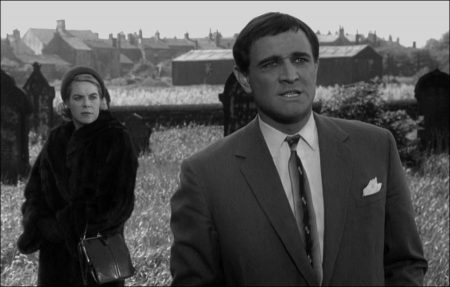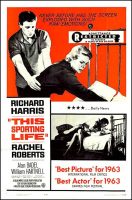Taglines: Never before has the screen exploded with such raw emotions!
This Sporting Life movie storyline. In drab early-1960s Wakefield, the volatile and aggressive young miner, Frank Machin, is determined to earn himself a place in the tough world of professional rugby and the local team. Hopelessly in love with his widowed and gloomily beautiful landlady, Mrs Margaret Hammond, Frank finds himself caught in the middle of his ferocious ambition and his unrequited love for the unattainable object of his desire, completely unable to break free from the agony of his bottled-up emotions. Now, all the riches of the world can’t buy Frank happiness. What is the price the rough rugby player will have to pay for his success?
This Sporting Life is a 1963 British Kitchen sink drama film directed by Lindsay Anderson. Based on the 1960 novel of the same name by David Storey, which won the 1960 Macmillan Fiction Award, it recounts the story of a rugby league footballer, Frank Machin, in Wakefield, a mining town in Yorkshire, whose romantic life is not as successful as his sporting life. Storey, a former professional rugby league footballer, also wrote the screenplay.
The film stars Richard Harris, Rachel Roberts, William Hartnell and Alan Badel. The film was Harris’s first starring role, and won him the Best Actor Award at the 1963 Cannes Film Festival. He was also nominated for an Oscar for Best Actor in a Leading Role. Roberts won her second BAFTA award and received an Oscar nomination for Best Actress. Harris was nominated for the BAFTA that year as well. The film opened at the Odeon Leicester Square in London’s West End on 7 February 1963.
This was Anderson’s first feature film as director, although he had won an Oscar for his short documentary, Thursday’s Children (1954), one of the documentaries he had made in the previous decade. The project had first been discussed by The Rank Organisation as a possible project for Joseph Losey and then Karel Reisz who, reluctant to direct another film with a similar setting and theme to Saturday Night and Sunday Morning (1960) suggested that Lindsay Anderson direct it with himself serving as producer.
Among the supporting cast is William Hartnell, who shortly afterwards began his role as Doctor Who. It was his role in This Sporting Life that brought Hartnell to the attention of Doctor Who producer Verity Lambert. The film also features Arthur Lowe, later to star in Dad’s Army, who appeared in four later films directed by Anderson.
Many of the scenes in This Sporting Life were filmed at Wakefield Trinity’s stadium, Belle Vue and at the Halifax stadium Thrum Hall. The scene where Frank (Richard Harris) leaps from a bus to buy a newspaper, then leaps back onto the bus was filmed at the top of Westgate, Wakefield. The location is still instantly recognisable and has changed little in the decades since. The houses used for filming the outdoor scenes in This Sporting Life were in Servia Terrace in Leeds.[citation needed] The riverside location where Frank takes the family for an outing in his new car is Bolton Abbey in the Yorkshire Dales.
This Sporting Life (1963)
Directed by: Lindsay Anderson
Starring: Richard Harris, Rachel Roberts, Alan Badel, William Hartnell, Colin Blakely, Vanda Godsell, Anne Cunningham, Jack Watson, Arthur Lowe, Harry Markham, George Sewell
Screenplay by: David Storey
Production Design by: Albert Fennell
Cinematography by: Denys Coop
Film Editing by: Peter Taylor
Art Direction by: Alan Withy
Makeup Department: Ivy Emmerton, Bob Lawrance
Music by: Roberto Gerhard
MPAA Rating: None.
Distributed by: Rank Organisation, Janus Films
Release Date: February 7, 1963 (London, West End)
Views: 151

